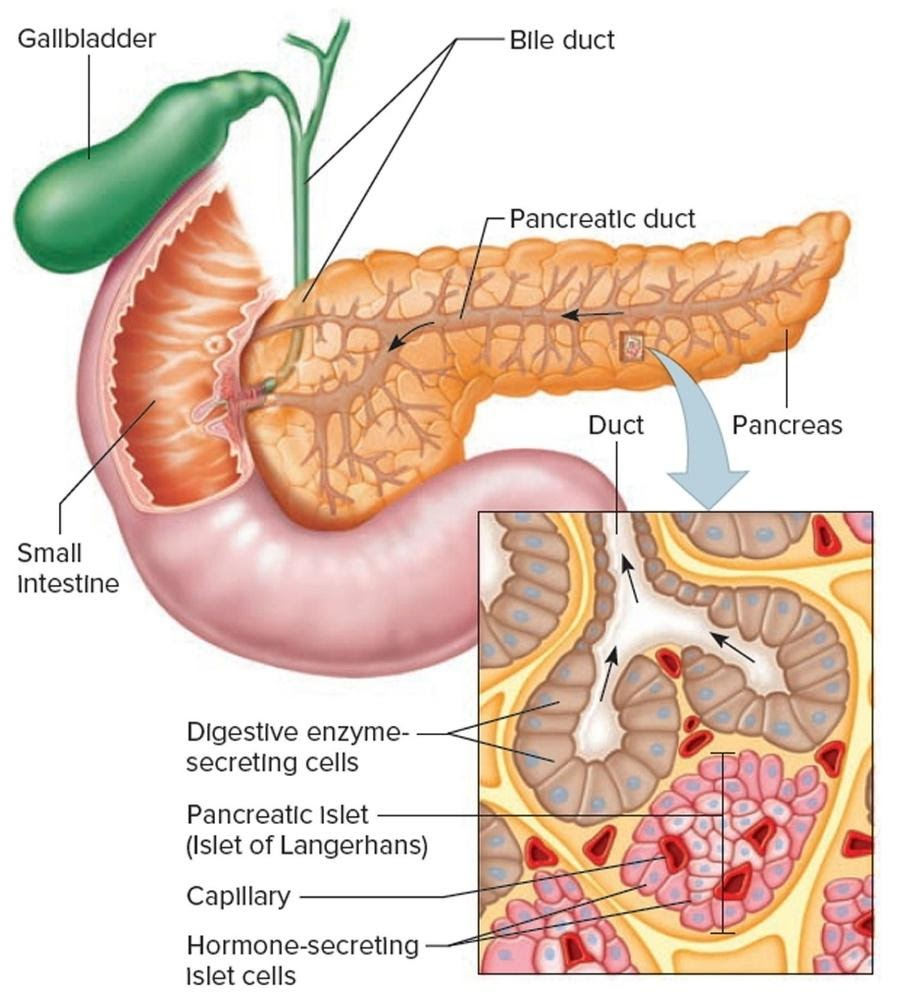
Prove that the pancreas is an exocrine as well as an endocrine gland. Write the functions of the pancreas.
Answer
506.4k+ views
Hint: Pancreas is an organ defined as both exocrine and endocrine. They can be neutral too. Symbiosis has three parts- commensalism, parasitism and mutualism. Pancreas is an endocrine gland as it secretes the blood-sugar level. Endocrine glands maintain the hormonal levels in the body subjected to any activity which the brain commands.
Complete answer:
Pancreas secretes insulin which helps to maintain the sugar level in the body, as the body absorbs sugar in the form of carbohydrates, starch, and fats which all contain sugars. Endocrine gland is the gland which regulates the hormones in the body and exocrine is secretion of juices in the body.
Exocrine glands make a pathway from the epithelial surface through a duct. Examples of exocrine glands are mammary glands, sebaceous glands and prostate. Exocrine glands are one of the glands whose secretions are mixed up directly in blood. Other than pancreas, the liver also acts as both endocrine and exocrine gland.
Pancreas goes on secreting pancreatic juice into the gastrointestinal tract, which is a characteristic of the exocrine gland. Enzymes present in pancreatic juice helps to digest the food better and mix it up in the blood faster.

Note:
All enzymes are derived from proteins. Hence, there’s this well-known proverb-that all enzymes are said to be proteins but all proteins cannot claim to be enzymes. Proteins are macromolecules which are said to be building blocks of the body, combining with other macromolecules like- carbohydrates and fats. Enzymes have a lock-key mechanism in which they directly attach to the substrate and get activated by factors and start the reaction at a faster rate.
Complete answer:
Pancreas secretes insulin which helps to maintain the sugar level in the body, as the body absorbs sugar in the form of carbohydrates, starch, and fats which all contain sugars. Endocrine gland is the gland which regulates the hormones in the body and exocrine is secretion of juices in the body.
Exocrine glands make a pathway from the epithelial surface through a duct. Examples of exocrine glands are mammary glands, sebaceous glands and prostate. Exocrine glands are one of the glands whose secretions are mixed up directly in blood. Other than pancreas, the liver also acts as both endocrine and exocrine gland.
Pancreas goes on secreting pancreatic juice into the gastrointestinal tract, which is a characteristic of the exocrine gland. Enzymes present in pancreatic juice helps to digest the food better and mix it up in the blood faster.

Note:
All enzymes are derived from proteins. Hence, there’s this well-known proverb-that all enzymes are said to be proteins but all proteins cannot claim to be enzymes. Proteins are macromolecules which are said to be building blocks of the body, combining with other macromolecules like- carbohydrates and fats. Enzymes have a lock-key mechanism in which they directly attach to the substrate and get activated by factors and start the reaction at a faster rate.
Recently Updated Pages
Master Class 11 Computer Science: Engaging Questions & Answers for Success

Master Class 11 Business Studies: Engaging Questions & Answers for Success

Master Class 11 Economics: Engaging Questions & Answers for Success

Master Class 11 English: Engaging Questions & Answers for Success

Master Class 11 Maths: Engaging Questions & Answers for Success

Master Class 11 Biology: Engaging Questions & Answers for Success

Trending doubts
One Metric ton is equal to kg A 10000 B 1000 C 100 class 11 physics CBSE

There are 720 permutations of the digits 1 2 3 4 5 class 11 maths CBSE

Discuss the various forms of bacteria class 11 biology CBSE

Draw a diagram of a plant cell and label at least eight class 11 biology CBSE

State the laws of reflection of light

10 examples of friction in our daily life




